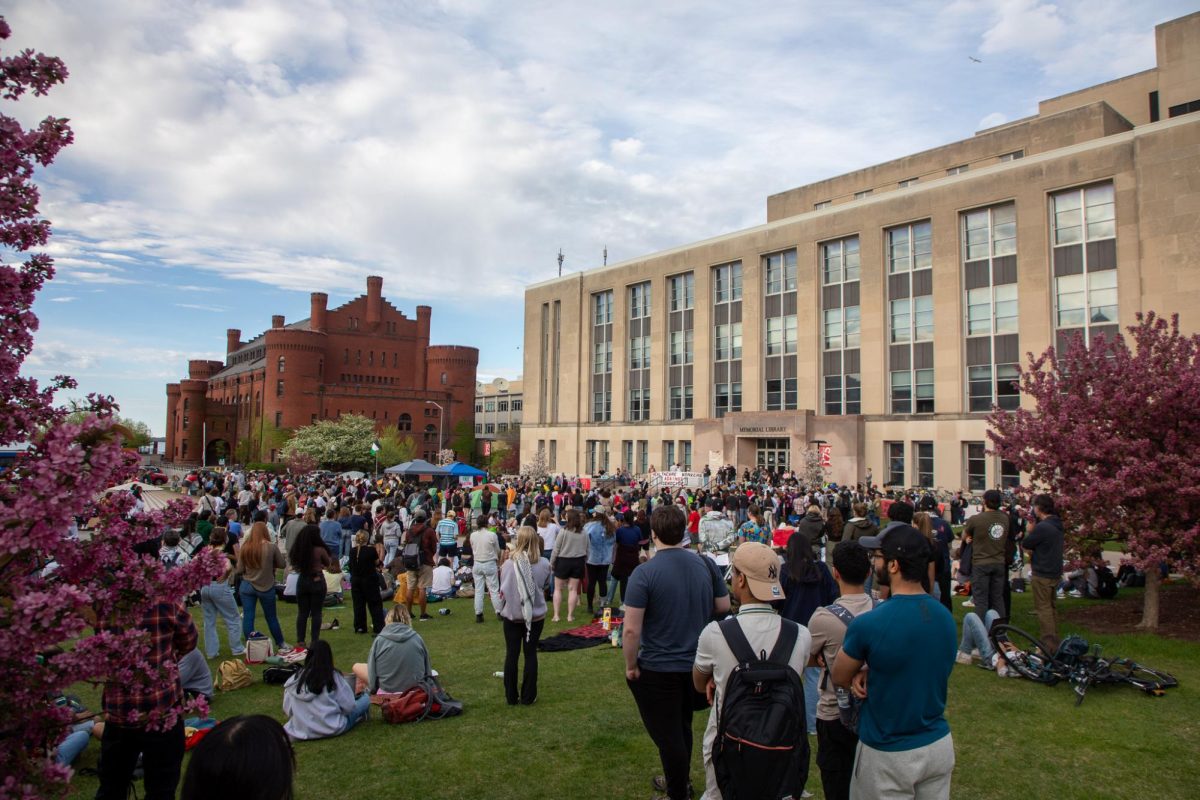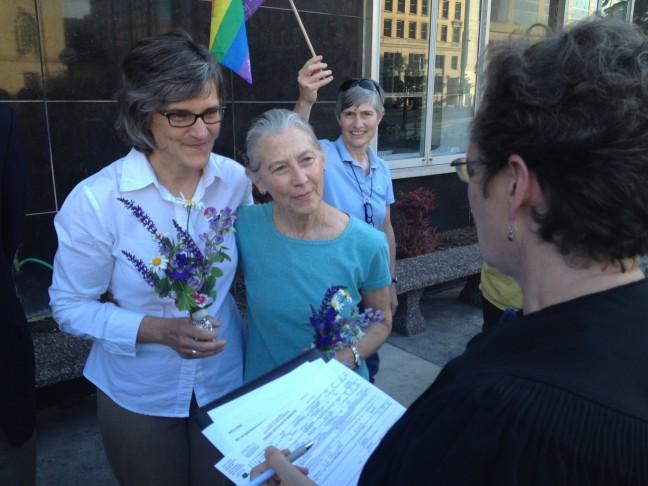Same-sex couples rushed to the Dane County clerk’s office Friday after a federal judge struck down Wisconsin’s ban on same-sex marriages.
U.S. District Court Judge Barbara Crabb ruled the state’s ban is unconstitutional Friday afternoon, a decision that Wisconsin Attorney General J.B. Van Hollen said he is appealing. Van Hollen, a Republican, also filed an emergency motion to block and clarify Crabb’s ruling, responding to clerks in Dane County and Milwaukee County who began issuing marriage licenses after the ruling.
Crabb, a Democratic appointee, wrote the ban violates the U.S. Constitution’s due process and equal protection clauses, as she said it violates the couples’ right to marry and discriminates against them because of their sexual orientation.
“Quite simply, this case is about liberty and equality, the two cornerstones of the rights protected by the United States Constitution,” Crabb wrote in the 88-page decision.
However, Crabb did not place an injunction on enforcement of the state’s ban. Instead, she told the American Civil Liberties Union, which sued on behalf of eight couples, that it has until June 16 to file motions detailing what “they want each named defendant to do or be enjoined from doing.”
The defendants include Van Hollen and Republican Gov. Scott Walker, who will have a week to respond to those motions, and after that, those suing them will have another chance to respond. At that point, Crabb wrote, she will decide on whether to place an injunction, or block, on enforcing the state’s ban.
Van Hollen, the state’s attorney general, called the decision “a setback” and said in a statement his office will “continue to defend the constitutionality of our traditional marriage laws and the constitutional amendment, which was overwhelmingly approved by voters” in a 2006 referendum.
Crabb’s lack of an injunction led to disagreements as to what the ruling’s effect was.
Van Hollen said “current law remains in force,” but Dane County Executive Joe Parisi disputed that interpretation while celebrating the couples marrying at the City of Madison-Dane County building.
“It’s certainly our interpretation that [same-sex marriage] not only is legal now in the state of Wisconsin, but that anyone that is married today will stay married,” Parisi said.
The Dane County clerk’s office issued marriage licenses until 9 p.m. Friday and will re-open Saturday from 9 a.m. until 5 p.m, according to Parisi spokesperson Casey Slaughter Becker.
In Milwaukee County, the clerk’s office was also issuing marriage licenses and will be open again Saturday, said Brendan Conway, a spokesperson for Milwaukee County Executive Chris Abele. Abele, a millionaire and philanthropist, is personally paying for any costs for the county, such as overtime, that arise, Conway said.
Those moves from the clerks drew a response from Van Hollen later Friday, who filed an emergency motion to block Crabb’s ruling and “preserve the status quo.”
“The Milwaukee and Dane County clerks’ issuance of marriage licenses to same-sex couples this weekend creates the non-uniform result that some same-sex couples can marry and others cannot,” Van Hollen wrote in the filing. “Further, like the Utah couples who married before [U.S. Supreme Court] Justice Sotomayor stayed the district court’s ruling … those couples who marry may be thrown into legal limbo depending on further developments in the case.”
Scott McDonnell, the Dane County clerk, said through the county spokesperson he will “stop issuing licenses for same-sex couples when a judge tells him to.”
Outside McDonnell’s office, meanwhile, same-sex couples began marrying — some of whom decided to marry somewhat spontaneously and some of whom waited for years to marry in Wisconsin. Cars that passed by honked, kids gave out flowers to the newlyweds, two police officers dropped off cakes and the crowd cheered after each of the marriages.



Mare Chapman, 70, and Pam Porter, 53, married outside the city-county building after considering going to a state that allows same-sex marriage. Chapman said it’s “fantastic to finally be respected and legitimate.”
Jan Hake and Pat Stevens, who are 58 and 60, started dating 17 years ago and were the 22nd couple to marry in Madison. They rushed to the building after hearing Van Hollen would appeal Crabb’s ruling.
“I didn’t know how long we’d have to wait, and I wanted to be married here in Wisconsin,” Stevens said. “This is where we live.”

Ilsa May, 30, and Megan Watt, 28, said they met while in graduate school in Indiana and started dating in August 2009. They said they were planning on marrying in Iowa, but will instead stay in Madison tonight “celebrating being in love.”


U.S. Rep. Mark Pocan, D-Madison, who is gay and married his husband in Canada, said in a statement he felt Crabb’s ruling was a step forward to “ensuring full equality for every American.”
“In ruling after ruling, it has become unmistakable that the promise of America is everyone should be treated equally and with dignity,” Pocan said. “Today’s ruling brings us one step closer to fulfilling that promise.”
Crabb’s ruling comes after a number of courts across the country have struck down similar bans in other states. The Human Rights Campaign, for example, called Wisconsin’s ban “the latest to fall.”
But Wisconsin Family Action Executive Director Julaine Appling said in a statement “the struggle to preserve and protect traditional marriage is far from over and will continue.”
“We are deeply disappointed but not surprised at Judge Crabb’s ruling,” Appling said. “All over the country federal judges have replaced ‘We, the people’ with ‘I, the judge’ when ruling on state constitutional amendments that define and protect marriage as one man and one woman. Rather than going through the stringent legislative process required to place a proposed constitutional amendment on the ballot for a vote, radical homosexuals have used the courts to nullify the vote of a majority of Wisconsin citizens as well as those in 26 other states.”
Crabb’s ruling also comes at a time of major shifts in public opinion on the issue of same-sex marriage, said University of Wisconsin journalism professor Michael Wagner.
“Younger people, even a substantial percentage of conservatives, favor gay marriage, so the biggest change has been with younger people,” Wagner said. “But the second biggest change has been among Democrats. Fifteen years ago, most Democrats opposed gay marriage, and now 70 percent or more support gay marriage.”
In 2006, 59 percent of Wisconsin voters approved including the same-sex marriage ban in the state’s constitution during a statewide referendum. Dane County was the only county in Wisconsin to vote against the ban.
However, a poll last month from the Marquette University Law School found 49 percent of Wisconsinites now back same-sex marriage, while 25 percent favor civil unions and 18 percent “prefer no legal recognition.” When those polled were asked later to choose between two options, 55 percent said they support same-sex marriage, and 37 percent said they opposed it.
For Christopher Gratten, 46, and Rob Krahenbuhl, 50, Crabb’s ruling was a “great relief,” as they said they thought the day would never come that they could marry in Wisconsin. They met each other 23 years ago and came from Verona to get married before any other rulings could block further marriages in the state.
“We didn’t want to wait,” Krahenbuhl said. “We said, ‘Let’s go. This is historic.’ It’s still a little surreal. The ring still feels funny on the left hand.”

















